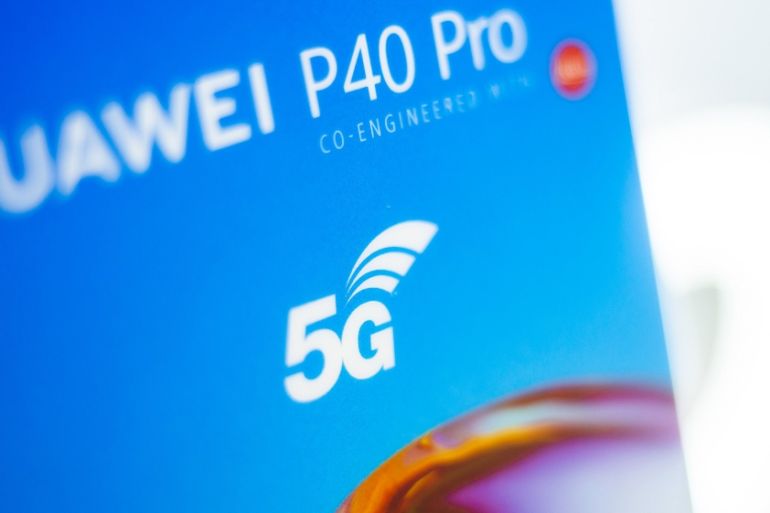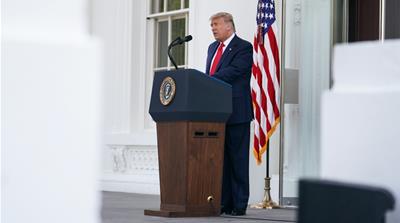China attempts to take lead on global data security: Report
Beijing’s draft report comes as US President Trump again threatens to ‘decouple’ world’s top two economies.

China is launching an initiative to set global standards on data security, countering US efforts to persuade countries to ringfence their networks from Chinese technology, the Wall Street Journal has reported.
Under its “Global Initiative on Data Security,” China would call on all countries to handle data security in a “comprehensive, objective and evidence-based manner,” the Journal said on Monday, citing a draft that it had reviewed.
Keep reading
list of 4 itemsRare deep-sea squid filmed by scientists
Palestinian life under Israeli occupation: An illustrated guideThis article will be opened in a new browser window
Boeing’s jets turn 70: A timeline of highs, lows and turbulence
The initiative would urge countries to oppose “mass surveillance against other states” and call on tech companies not to install “back doors in their products and services to illegally obtain users’ data, control or manipulate users’ systems and devices”.
Chinese Foreign Minister Wang Yi is scheduled to announce the initiative on Tuesday at a seminar in Beijing on global digital governance, the report said.
Chinese diplomats have approached a number of foreign governments to seek their support for Beijing’s initiative, according to the report.
In recent months, the administration of United States President Donald Trump has clamped down on what it describes as national-security threats from Chinese technology firms such as Huawei Technologies – a global leader in advanced mobile telecommunications – and popular Chinese apps including ByteDance Ltd’s TikTok and Tencent Holdings Ltd’s WeChat.
Washington has also rolled out a “Clean Network” initiative to exclude Chinese tech firms perceived as threatening national security.
Chinese officials, meanwhile, have accused the US of trying to sabotage the efforts of Chinese businesses to expand.
The great decoupling
Separately, Trump on Monday raised the idea of separating the US and Chinese economies, suggesting the US would not lose money if the world’s two biggest economies no longer did business.

“So when you mention the word decouple, it’s an interesting word,” Trump told a Labor Day news conference at the White House in which he promised to bring jobs home from China.
“We lose billions of dollars and if we didn’t do business with them we wouldn’t lose billions of dollars. It’s called decoupling, so you’ll start thinking about it,” Trump said.
Trump, who had once touted friendly ties with Chinese President Xi Jinping as he sought to make good on promises to rebalance an enormous trade deficit, has made getting tough on China a key part of his campaign for re-election on November 3.
Western companies have long complained that Beijing forces them to hand over proprietary technology in return for access to China’s large internal market and comparatively low labour costs.
Trump has accused his Democratic opponent, Joe Biden, who leads in most opinion polls, of being soft towards Beijing.
“If Biden wins, China wins, because China will own this country,” he said.
Biden for his part has criticised Trump’s phase-one trade deal signed with China in January, saying it is “unenforceable,” and “full of vague, weak, and recycled commitments from Beijing”.
Trump promised that in future his administration would ban federal contracts with companies that outsource to China and hold Beijing accountable for allowing the coronavirus, which began in China, to spread around the world.
‘Manufacturing superpower’
“We will make America into the manufacturing superpower of the world and will end our reliance on China once and for all. Whether it’s decoupling, or putting in massive tariffs like I’ve been doing already, we will end our reliance in China, because we can’t rely on China,” Trump said.
“We will bring jobs back from China to the United States and we will impose tariffs on companies that desert America to create jobs in China and other countries,” he added.
US Treasury Secretary Steven Mnuchin said in June that a decoupling of the US and Chinese economies would result if US companies were not allowed to compete on a fair and level basis in China’s economy.
Other officials and analysts have said that the two countries’ economies are so intertwined as to make such a move impractical, but Washington would continue to pressure Beijing to level the playing field.